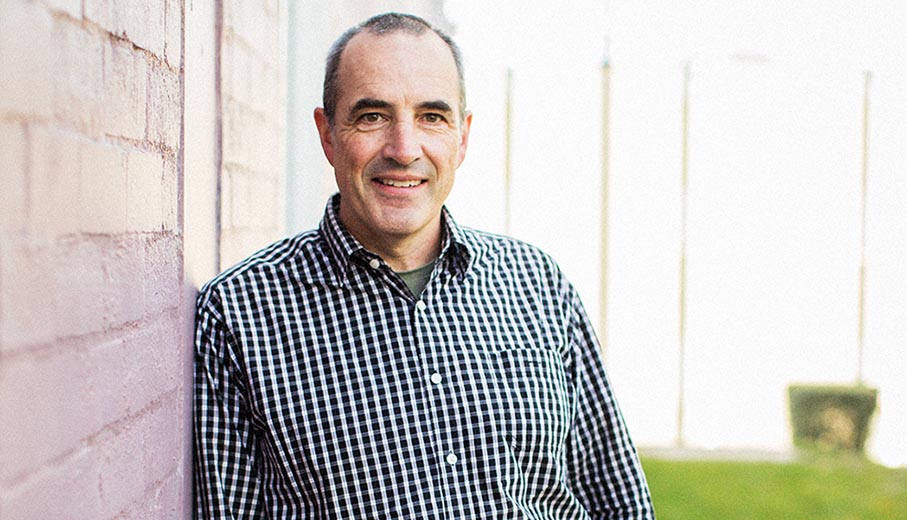"They are a secretive marsupial that people rarely see," Karl says.
"They eat rainforest fruits and leaves by day and then graze on the edge of the forest at night. They live in this amazing habitat, right in my backyard, and they practically never sleep."
High praise indeed from a scientist who has spent much of his career studying nocturnal animals.
"To do what I do, you have to enjoy getting out in the bush at night," Karl says, whether it's investigating the truffle-eating habits of bandicoots, how wombats cross roads, or the mating behaviour of endangered bettongs.
But the Associate Professor in biology, conservation and wildlife management has no complaints, given that he lives within a rich hotspot for native mammals.
"Even 13 years on, there is still so much to learn about this region's diverse environments and animals, and I try to get out hiking most weekends just for fun," he says.
However, things would have been very different had he pursued his original ambition to become a marine biologist.
"From the age of 14 or 15 I wrote to James Cook University every year for their course guides and was accepted to study marine biology there after I completed school," Karl says.
"But doing some volunteer fieldwork opened up the wonders of terrestrial rainforest life.
“From then on, a fellow student and I would take ourselves off into the rainforest whenever we could to find stuff, and I began helping a lecturer studying bandicoots on the James Cook campus.
“I'd be up at 5 am helping him trap bandicoots, then head off to class, and I started doing volunteer field work for national parks staff and environmental consultants."
Karl completed his Masters and PhD in zoology at James Cook, and a post-doctoral fellowship at the Mount Allison University in Canada before launching his teaching career.
He joined UNE's team in 2003.
"I was established as a macropod biologist by then and UNE had a strong history of that work," he says.
"During the interview process a technical officer took me out to Dangar Falls, just 15 minutes' drive from Armidale, and I remember thinking that there would be plenty to keep me interested in this amazing gorge country.
"And it's not just the threatened native animals, but also the introduced species like feral horses. There's no end to what you can do here.
“I still enjoy the pure ecology; when you are learning about a species and acquiring new knowledge that will help to inform future management. There's never a dull moment."
Nor are there geographical constraints when it comes to Karl's dedication to wildlife management. He has fostered cross-cultural collaboration to help less affluent countries improve their own conservation efforts.
"In Bhutan, where we have been looking into how mammals use the corridors that link protected areas, we have worked with Bhutanese researchers to help them to develop their research skills," Karl says.
“As a result, we now have Bhutanese students here at UNE working to solve conservation problems back in Bhutan.
“On the Yucatan Peninsula in Mexico we have been undertaking research into the mysterious subterranean sinkholes (called cenotes) and the animals that use them (including jaguars, ocelots and tapirs), which are facing pressures from mass development and tourism.
“This work is in partnership with a grassroots conservation organisation. What we learn in Mexico or Bhutan can easily be applied in Australia, and vice-versa."
Thanks to the ongoing partnerships, UNE undergraduate students enjoy an annual two-week field trip to Bhutan.
"Some come back completely changed; it transforms their world view to see the challenges of conservation management in another country," Karl says.
"It's not just an ecological lesson but an important life lesson."
Karl says there are not too many days when he doesn't get "wide-eyed and excited" about something, especially with students routinely setting and collecting camera traps or spotlighting vulnerable species a short drive away.
"My aim as their teacher is to get them inspired to go out and make a difference in terms of conservation and future management," he says.
"I want them to be brilliant in the world and to make a bigger difference than I have during my career."
Teaching is therefore a privilege.
"I love to teach; to bring the excitement of the natural world, what we know about it and what we don't know about it, to the study of biology and ecology," Karl says.
"It's a nice, easy atmosphere for interactions with students at UNE. We have small class sizes and good lecturers who are actively conducting research of their own."
Try keeping Karl out of the bush. "Getting into nature, for me, is like a Sunday service is for the religious," he says. "It's vital to me and good for my soul."


